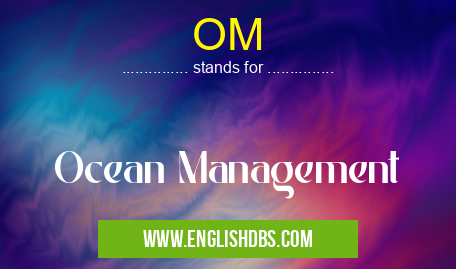What does OM mean in MANAGEMENT
Ocean Management (OM) is a broad field that encompasses the study of the ocean's resources, their management, and the conservation of marine ecosystems. It applies principles from various disciplines, including biology, economics, law, and policy, to address the sustainable use of marine resources.

OM meaning in Management in Business
OM mostly used in an acronym Management in Category Business that means Ocean Management
Shorthand: OM,
Full Form: Ocean Management
For more information of "Ocean Management", see the section below.
» Business » Management
Scope of Ocean Management
OM involves a wide range of activities, including:
- Resource Management: Sustainable management of fisheries, aquaculture, and offshore energy resources.
- Environmental Protection: Conservation of marine ecosystems, biodiversity, and water quality.
- Coastal Planning and Development: Balancing economic development with environmental protection in coastal areas.
- Marine Policy and Law: Development and implementation of laws and policies governing ocean use.
- Education and Research: Promoting understanding of marine ecosystems and fostering innovation in ocean management practices.
Importance of Ocean Management
The ocean plays a crucial role in our planet's health and economy. OM ensures the sustainable use of marine resources, which provide food, livelihoods, and recreation. It protects marine ecosystems, which are essential for biodiversity, carbon sequestration, and climate regulation. By managing ocean resources wisely, we can preserve them for future generations.
Essential Questions and Answers on Ocean Management in "BUSINESS»MANAGEMENT"
What is the primary goal of Ocean Management (OM)?
The primary goal of OM is to sustainably manage ocean resources and ecosystems for present and future generations. This involves balancing the needs of various stakeholders, including industries, governments, academics, and the public.
What are the main challenges facing OM today?
OM faces numerous challenges, including climate change impacts, overfishing, marine pollution, and the loss of biodiversity. These challenges require collaborative solutions that address the interconnected nature of ocean systems.
How does OM promote sustainable fishing practices?
OM implements measures to regulate fishing activities, such as catch limits, gear restrictions, and marine protected areas. These measures aim to ensure the long-term sustainability of fish stocks and protect marine ecosystems.
What role does marine spatial planning (MSP) play in OM?
MSP is a tool used in OM to allocate and manage ocean space for different activities, such as fishing, shipping, and conservation. It helps prevent conflicts between users and ensures the sustainable use of marine resources.
How does OM address the impacts of climate change on ocean ecosystems?
OM incorporates climate change adaptation and mitigation strategies into its management plans. These strategies aim to reduce greenhouse gas emissions, protect vulnerable marine habitats, and enhance ecosystem resilience to climate change impacts.
What is the importance of stakeholder engagement in OM?
Stakeholder engagement is crucial in OM as it ensures that the needs and perspectives of all parties are considered. Through consultation and collaboration, stakeholders can contribute to decision-making, foster consensus, and enhance the effectiveness of ocean management practices.
How does OM contribute to the protection of marine biodiversity?
OM establishes marine protected areas, implements species conservation measures, and monitors marine ecosystems to protect biodiversity. By preserving habitats and species, OM helps maintain the health and resilience of ocean ecosystems for future generations.
What are the economic benefits of effective OM?
Effective OM supports sustainable economic activities related to fishing, tourism, and transportation. By ensuring the health and productivity of ocean ecosystems, OM contributes to job creation, economic growth, and the well-being of coastal communities.
Final Words: OM is a vital field that addresses the complex challenges posed by the use and conservation of marine resources. Through a collaborative approach involving scientists, policymakers, and stakeholders, OM aims to ensure the sustainable management of our oceans and the well-being of both marine life and human societies that depend on them.
